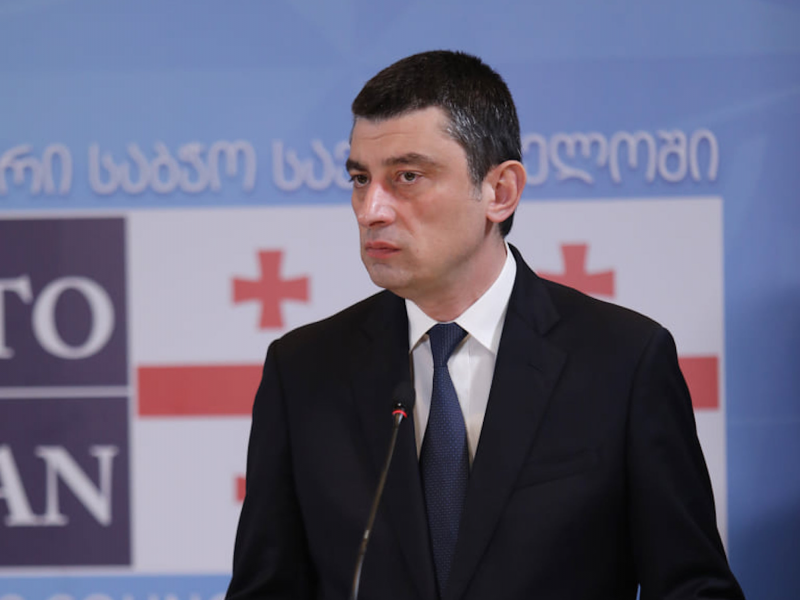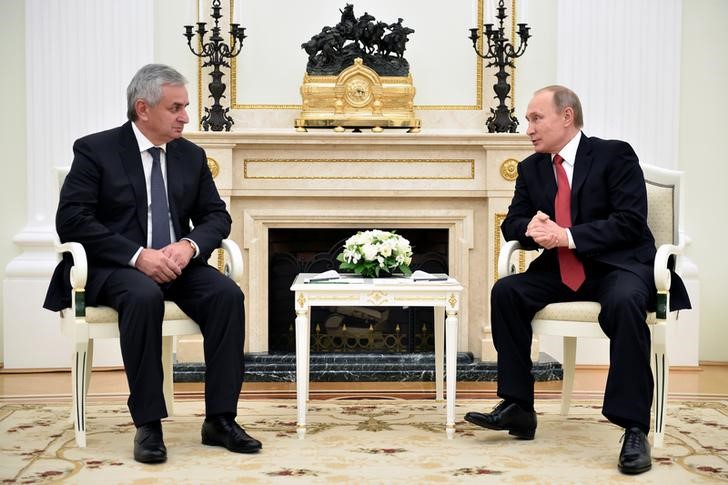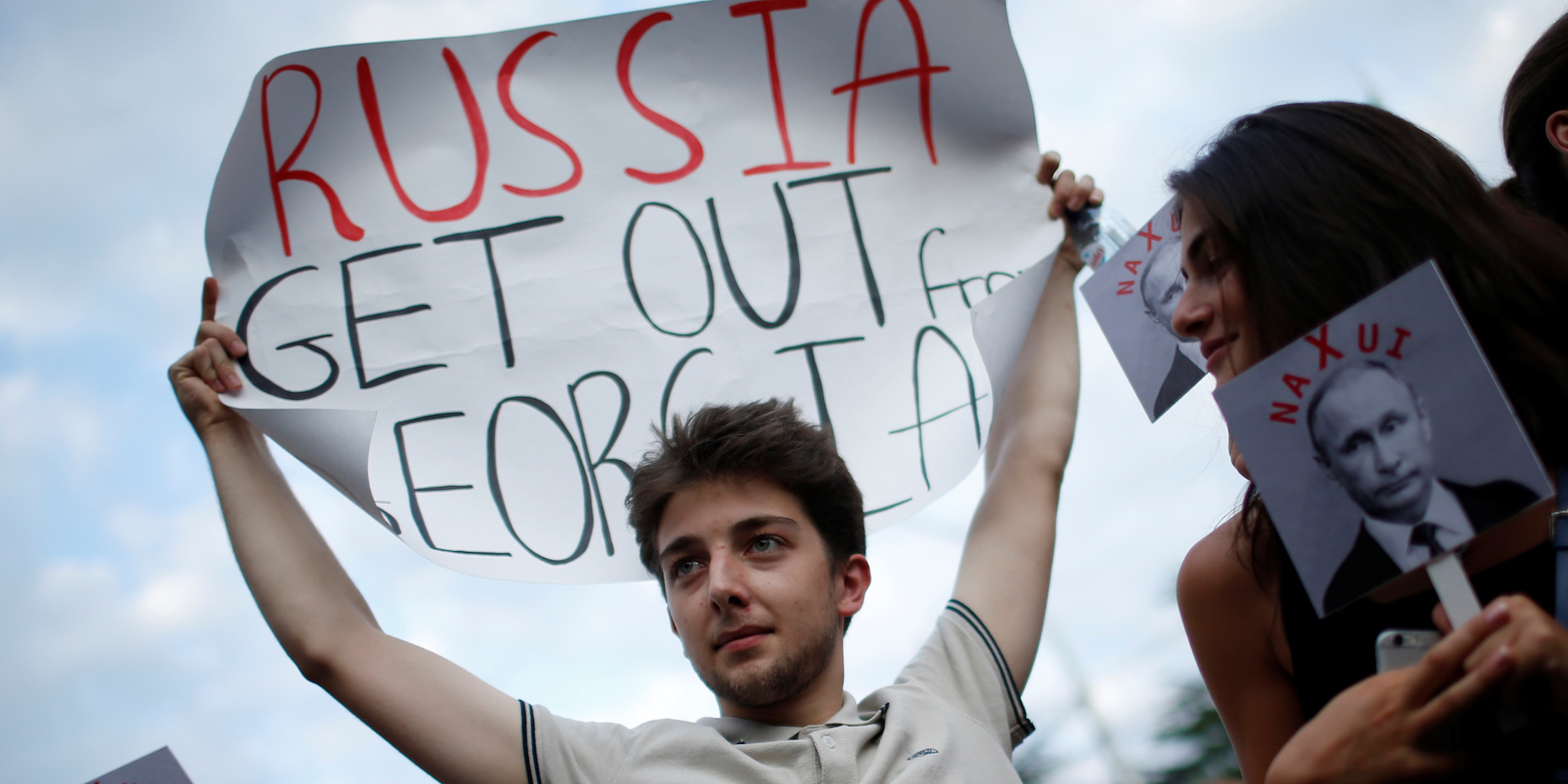- Russia has been bullying Georgia for years and quietly seizing territory along the ill-defined borders of disputed territories.
- A bipartisan group of US lawmakers on Tuesday passed a bill – the Georgia Support Act – that Georgia’s new prime minister, Giorgia Gakharia, views as critical to thwarting Russia’s encroachment in the region.
- The bill’s passage comes amid heightened tensions between Russia and Georgia linked to anti-Kremlin protests that occurred in Tbilisi in June after a Russian lawmaker spoke in Georgia’s parliament. The protests prompted Moscow to suspend travel to Georgia.
- Gakharia’s critics have characterized him as too cozy with the Kremlin, but he strongly rejected that characterization: “Our government and our party have done more to stand up to Russia and fight for full integration into the EU and NATO than any previous Georgian government.”
- Visit Business Insider’s homepage for more stories.
A little over a decade after the two countries fought a five-day war in August 2008, Russia continues to bully Georgia and has been quietly seizing more territory along the disputed border of the former Soviet republic.
Russia’s so-called “borderization” tactics in Georgia have split communities apart and sparked allegations of serious human rights abuses.
A bipartisan group of US lawmakers on Tuesday passed a bill – the Georgia Support Act – that Georgia’s new prime minister, Giorgia Gakharia, views as critical to thwarting Russia’s encroachment in the region.
“Our government has been relentless in making sure the Georgia Support Act passed with bipartisan support at the committee level that is now working its way forward in the US Congress,” Gakharia told Insider ahead of the bill’s success in the House in his first comments to US media since he became prime minister in early September.
He added: "Only through strong international support will we be able to restore our territorial integrity peacefully."

The 2008 Russia-Georgia war is in many ways ongoing
The 2008 Russia-Georgia war was primarily fought over the disputed territories of South Ossetia (or the Tskhinvali Region) and Abkhazia. The Kremlin has occupied these territories since the short-lived conflict ended, and recognizes the independence of the two breakaway regions. Both territories host Russian military bases and troops.
Georgia, however, sees Abkhazia and South Ossetia as part of its sovereign territory, and along with most of the international community views Russia's presence there as an illegal occupation of roughly 20% of its land. The international community does not recognize the Russia-backed governments in South Ossetia or Abkhazia.
The subject of who sparked the 2008 war is a matter of debate, though an independent report commissioned by the European Union pointed to Georgia as firing the first shots. The report also said that Russia's response, which involved its forces going well beyond the disputed regions, was excessive and stood in violation of international law.
Meanwhile, a July 2019 report from Amnesty International on Russia's occupation of South Ossetia and Abkhazia, along with the "borderization" tactics, has led to "severe" restrictions on freedom of movement and a slew of human rights violations.
Russia and allied forces in the region have set up various physical boundaries along the disputed border, including barbed wire, fences, and ditches, that Amnesty said has cut locals off from "farmland, water sources, places of worship and even family burial sites."
The Georgia Support Act authorizes sanctions against those responsible for or complicit in human rights violations in South Ossetia and Abkhazia. It's not clear whether the bill will pass in the Senate and the White House did not immediately respond to a request for comment from Insider on whether President Donald Trump supports the legislation and would sign it.
The Trump administration has spoken out against Russia's activities in and around Georgia in the past. The State Department in August, for example, condemned Russia's "borderization" in Georgia and called on it to "suspend its illegal occupation of 20 percent of Georgian territory."

'We live in a tough neighborhood'
The US and Georgia have had close relations for years - particularly after the 2008 war - and Washington has provided Tbilisi with millions in aid as it continues to face Russian aggression. This is also linked to Georgia's contributions in Afghanistan - it's played a major role in supporting the North Atlantic Treaty Organization (NATO) there as part of the International Security Assistance Force (ISAF).
Republican Rep. Adam Kinzinger, an Afghanistan veteran who introduced the Georgia Support Act with his House Foreign Affairs committee colleague Democratic Rep. Gerry Connolly, celebrated the passage of the bill in a statement that cited Georgia's support for NATO and longtime desire to join the historic alliance as it continues to face Russian aggression.
"The US plays a pivotal role in encouraging our Georgian allies to continue working towards independence and complete separation from their aggressive neighbor, Russia. I'm proud of their efforts and aspirations to join the NATO alliance, and applaud their commitment to democratic values," Kinzinger said.
Echoing these sentiments, Connolly in a statement said: "With this vote, the House sends a clear and unequivocal statement of support to the people of Georgia in their struggle against an ever-looming Russian threat."
Connolly also said he's "particularly" pleased the bill "recognizes that Georgia has been a longstanding NATO-aspirant country."
Georgia has been trying to join NATO for years, but the 2008 war threw a wrench in the process. Russia continues to warn against it as well, and has suggested it could trigger a "terrible conflict."
Despite Russia's threatening language, Georgia is still pressing ahead with NATO membership. Gakharia told Insider that Georgia's desired integration with NATO as well as the European Union is an essential aspect of its "own democratic transformation" and central to its efforts to push back against Russia.
"We have made it clear that the EU and NATO are Georgia's choice," Gakharia said. "Georgia is, and will remain firmly oriented, toward the West. That is our culture, that is our history, that is what our people want."
"Our focus on Western alliances is essential for us to protect our sovereignty and maintain peace and stability," Gakharia said. "As you are aware, we live in a tough neighborhood where Russia continues its illegal occupation of twenty percent of our territory, constantly building its military presence in the Georgian regions of Abkhazia and South Ossetia. Peaceful unification of Georgia remains our goal."
'Russia does not define Georgia, and Russia will not define our future'
Gakharia's ascent to the role of prime minister was controversial among many Georgians and came after a dramatic summer that saw tensions rise to historic heights between Tbilisi and Moscow.
In June, the Georgian capital was consumed by protests after a Russian lawmaker was permitted to address the Georgian parliament in Russian from the speaker's chair. Riot police were sent to disperse the demonstrators as they tried to storm parliament, and approximately 240 people were hurt in the brutal crackdown. Police used rubber bullets and tear gas, according to BBC News.
Members of the opposition party, the United National Movement, have called on Gakharia - who was interior minister at the time - to resign over the crackdown. Protests also continued in Tbilisi against Gakharia's ruling Georgian Dream party shortly after he was named prime minister in late September.
Critics of Gakharia and his party view him as too cozy with the Kremlin, but the Georgian prime minister told Insider he "would strongly disagree with that characterization."
"Our government and our party have done more to stand up to Russia and fight for full integration into the EU and NATO than any previous Georgian government," he said. "We will not back down from that proposition. Russia does not define Georgia, and Russia will not define our future."
Russia suspended travel to Georgia following the anti-Kremlin protests in June, though there are signs that flights could resume in the near future.
Gakharia said the ban "clearly impacted our economy" but that the government "appreciated the solidarity and upswing in tourism from other countries who also believed the ban was unreasonable."
The Georgian prime minister said he welcomes the resumption of flights between Russia and Georgia, adding: "We didn't agree with the suspension and neither did Russian tourists who found ways to travel to Georgia despite the flight ban."
Gakharia said he has "no quarrel with the people of Russia who want to experience our culture."

